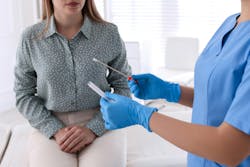The latest efforts in cervical cancer prevention: An interview with Leeya Pinder, MD
MLO: Would you please share with us the key takeaways from the National HPV Conference that took place in April?
Leeya Pinder, MD: This was first time this conference has been held in the United States, instead of internationally, and it honed in more on the needs we have here. Clinicians, nurse practitioners, public health providers, patient advocates, and survivors were able to brainstorm on innovative ways to bring the science forward here. There are a lot of people who are trying to make a difference in the number of people who are dying from HPV-associated diseases: cervical cancer, anal cancer, penile cancer, oral pharyngeal cancer.
I focus here and internationally on cervical cancer prevention, with a lot of work on HPV. The key takeaway I got from this conference is there are a lot of people working in this space to prevent people from dying from a disease that is wholly preventable. Conference attendees discussed HPV vaccination and how it is being integrated into communities. We also looked at secondary prevention for cervical cancer — the screening component. Specifically, how to increase access to cervical cancer screening and novel ways to do that. Cervical cancer screening can be cumbersome for some women with barriers with it like how to find an appointment, how to rearrange life, and navigating competing priorities to make an appointment in an office.
At the conference, we talked a lot about HPV self-collection. BD is one of our partners in the self-collection space. This allows collection in any type of clinic environment — whether in the office or a mobile platform like a bus. Novel ways of bringing screening to the community and health equity are what I focus on. I also focus on education — helping people understand the importance of HPV vaccination and the importance of screening. I also help people understand what we can do if something abnormal is found during screening to prevent cervical cancer.
MLO: Please elaborate on the mobile platform, the bus. Is screening taking place on the bus?
Leeya Pinder, MD: This is a social services bus that goes into different communities. We offer education on the bus, but there are also rooms on the bus for screening. We can provide this screening in the community for women who haven’t been screened lately, and it gives them the opportunity to self-collect. When we receive the results back, we can provide education, and if needed, connect them with a clinic if there is a need for further management. It also gives us a chance to see who is high-risk HPV negative, and depending on their age, they can be offered vaccination. So, this is an opportunity to meet people where they are instead of them rearranging their schedules to come see us. Screening is important, but we really need that follow up component as well.
MLO: How often should someone be screened for cervical cancer?
Leeya Pinder, MD: It depends on the testing modality. We have different versions of tests for cervical cancer screening. Cytology alone — pap testing — is every three years. Primary HPV testing is done every five years if someone tests negative. If someone has an abnormality, that frequency can vary, and for some people it could be every single year. The important point I always mention to people is that it is important to come in for the well-woman checks because there are other things that we talk about and there are other health challenges that we want to address. It is important to understand that it is not just the screening that your clinician does but the whole person.
MLO: Going back to patients that you served on the bus, how do you ensure that these patients are keeping up with their screening three to five years after that visit?
Leeya Pinder, MD: This is something we are working on using community navigators. Within each community, we have people who are well known to the community and can provide upfront education and information on the results when they come back. Once we have these patients in our system, we will use texting and apps for reminders in addition to mailings and telephone calls to remind them. We also try to do pop-up education sessions and health fairs. There is of course no guarantee that someone will follow up in that three to five-year period. But we have multiple mechanisms that we will try to do that.
MLO: How are laboratorians involved in the self-collection space?
Leeya Pinder, MD: Laboratorians are actually great partners in this and are part of our champion core. At my organization, they partner with us to get messaging out and they also ensure that all of the platforms and assays are in place for cervical cancer screening initiatives. In the beginning, I did get some pushback from people on whether self-collection was an effective way to screen people. The laboratorians I work with were able to provide data to colleagues that this was actually a safe and effective method for screening for cervical cancer in our community. At the HPV conference, pathology and laboratory professionals presented their studies on the effectiveness of self-screening, so that was great to see.
MLO: What are the cervical cancer rates in the United States?
Leeya Pinder, MD: There are about 14,000 women who are diagnosed with cervical cancer every year. That may sound like a small number in the grand scheme of things, but it is a preventable disease. 14,000 in the U.S. really matters when it is your family member — your sister, your mother, your friend — and we can actually decrease that number if we have access to all of these preventative services. It significantly impacts people who do not have access, such as our rural populations, indigenous populations, and our poorer communities. These are the people who are most significantly impacted. Many times, these women are the center of the family: a primary caregiver or breadwinner. So, when you take that person out of the equation, it affects mortality for children, suffering for children, even the economy of a community.
Leeya Pinder, MD, is a gynecologic oncologist, global health clinician and international researcher. Following medical school, she completed her residency in Obstetrics and Gynecology at the University of Cincinnati and then practiced in Charlotte, North Carolina for several years. Desiring to make a greater impact, Dr. Pinder transitioned from private practice to complete a Master of Public Health at Harvard University as well as fellowships in Global Health Leadership at Massachusetts General Hospital, Postdoctoral Research and Global Women’s Health with UNC Chapel Hill and Gynecological Oncology at the University of Washington. She is dedicated to improving the health of women worldwide through her research and patient-focused care. Her research interests include implementing clinical trials tailored to women residing in low- and middle-income countries, expanding equitable cancer care for women of historically marginalized communities, and creating solutions to close the human resource gap and reduce disparities in gynecologic cancer-related outcomes.


